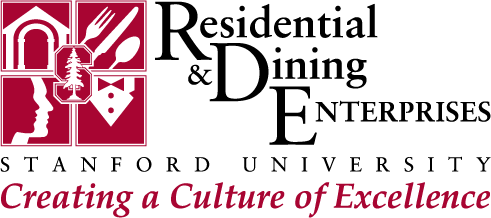
Sustainability by Division in R&DE
We are proud to support the University’s sustainability goals in everything we do, from introducing more efficient waste systems and food sourcing strategies to green cleaning and zero-waste programs that promote sustainable living. We make a significant positive impact on our students’ and customers’ awareness and habits while achieving substantial savings and ensuring the Stanford campus’s long-term viability. See what each R&DE division is doing, below.
Student Housing Operations Stanford Dining Stanford Hospitality & Auxiliaries Stanford Conferences

Student Housing Operations
We collaborate with students, staff, and university partners to foster behavior change and integrate long-term sustainable thinking into our housing operations.
- We work with our Maintenance & Capital Projects team to apply sustainability principles to renovation and construction projects.
- We partner with campus groups in programs that encourage sustainable and carbon-free living on campus. We regularly conduct energy and water reduction competitions in our residences.
- We strive toward the University’s zero waste goals by increasing awareness of composting and recycling collection points. We hold a year-round donation drive, Give and Go, that diverts over 50 tons of waste from the landfill every year. https://rde.stanford.edu/studenthousing/zero-waste-goal
- Stanford is the first university in the US to adopt a green cleaning system, Cardinal Clean, to sanitize nearly 100 residence halls, dramatically reducing chemical usage and harm to human health and the environment.
- Our internship program attracts Stanford students that focus on sustainable behavioral change and research. These student research projects influence the development and ensure the success of new initiatives throughout the division.
- Read more about Sustainable Living.

Stanford Dining
We are committed to providing healthy and delicious meals that nourish students and positively influence lifelong eating behaviors.
- We collaborate with students, staff, and faculty to reduce our food-related environmental impact through innovative procurement strategies and menuing practices.
- We invest heavily in technology that monitors and helps reduce food waste. We partner with non-profit organizations such as Second Harvest of Silicon Valley to funnel food to local communities.
- Through our pioneering work in the Menus of Change University Research Collaborative, our dining halls have become living laboratories for research in eating behavior and menu development. We help educate and empower the Stanford community and beyond to make sustainable food choices.
- Stanford Dining’s culinary team develops plant-forward menus that promote healthy eating while mitigating the overall effects of unsustainable food production practices.
- Read more about Stanford Dining’s Sustainability Initiatives.

Stanford Hospitality & Auxiliaries
We are committed to reducing our environmental impact in our hospitality operations through strategic purchasing, waste reduction, optimizing efficiencies, and staff training.
- We work closely with our vendors in collaboration with our Vendor Management & Finance team to reduce our environmental impact by purchasing sustainable ingredients and optimizing their use through creative menu planning.
- We commit to the University’s Zero Waste goals by providing reusable dishware where possible and compostable products where reusables are not possible.
- Stanford Catering operations commit firmly to the university’s Cardinal Green Event requirements leading to instituting sustainability initiatives in its operations and achieving Cardinal Green Event certification.
- We provide composting and recycling collection bins in all retail cafes and minimize food waste by monitoring inventory and making data-driven food purchasing decisions. https://www.stanforddaily.com/2019/10/14/students-recover-1000-pounds-of-leftover-food-from-stanford-stadium-concessions/
- Read more about Stanford Hospitality & Auxiliaries Sustainability initiatives

Stanford Conferences
We integrate sustainable practices into all aspects of the event planning process, and we extend this knowledge to our peer departments, external client groups, and conferees.
- We work with university partners to abide by the university’s Zero Waste event requirements, integrating sustainable practices in the conference continuum, from housing and dining to venue selection and event logistics.
- We embrace a fully digital communication platform, minimizing the use of paper and forms and integrating contracts and essential documents into our system of record.
- We choose catering services that use local and organic ingredients and recommend carpooling and public transportation to reduce our carbon footprint.
- We continually assess operations against peer divisions in housing, dining, and hospitality, and we adopt continuous process improvement in every phase of our meeting planning and conference business.
